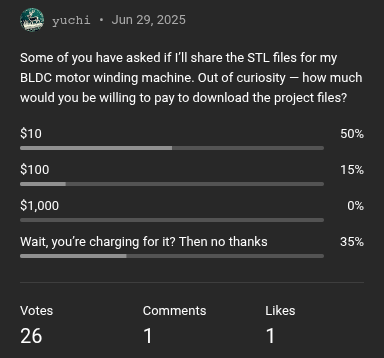Why Open Source Hardware is Hard
Open source software has changed the world—but can the same model work for hardware? I'm not so sure.
I rely on amazing open source software every day: Ubuntu, KiCad, FreeCAD, and many others. These tools empower independent developers and makers like me to build and create without corporate gatekeepers. So naturally, I love the idea of open source.
But when it comes to hardware, I hesitate.
Unlike software, where sharing often leads to growth, open sourcing hardware can actually undermine your ability to sustain the work.
Why isn't open source hardware more popular?
I won't open source the winding machine.
Recently, many people have asked me to open source the BLDC motor winding machine I built. I understand the desire to share knowledge and help others, but I won't do it.
The reason is simple: I won't be rewarded for doing so.
Don't get me wrong—I love open sourcing. There are many benefits to open sourcing software.
Here is the reasons why I like to open source software:
- Useful feedback: When I open source software, I get useful feedback from users as a form of bug reports, feature requests, and pull requests. This helps me improve the software and make it more useful for everyone.
- Contributions: Open source software allows others to contribute to the project, which can lead to new features, bug fixes, and improvements that I might not have thought of.
- Sustainability: Open source software can be monetized through selling hardware, offering paid support, or providing consulting services. This can help sustain the project and allow me to continue working on it.
Famous examples: Linux, openpilot
Open Hardware Projects
Now, let’s look at some projects that open sourced their hardware:
1. Comma.ai
Comma.ai sells self-driving car kits powered by open source software, openpilot. However, their hardware is not open source anymore.
They initially released an open source hardware project called neo, but later decided to close it.
The founder, George, mentioned during his live stream that he thinks it's because the market became flooded with low-quality clones, which made it not worth maintaining the hardware as open source.
2. Aaed Musa
Aaed Musa is a YouTuber who creates open source hardware projects, such as the Internal Cycloidal Actuator from his YouTube channel.
I appreciate his work, but I also noticed that there are no pull requests or contributions to his projects on GitHub. Even though he has a large following, it doesn't seem like anyone is contributing to his open source hardware projects, or even giving some useful feedback.
Also, if you just want some feedback, you don't have to open source the hardware. You can just post a video on YouTube and ask for feedback.
I know my winding machine is a very niche project, and it won't attract a large audience like two examples above.
Thank you for voting in the YouTube poll I posted. Personally, I believe the winding machine design is worth more than $2,000, but I won't be rewarded that amount from the collective response to the poll.

Donations are not Sustainable
I don't like Patreon or other donation-based models. For me, they are not sustainable, and I don't want to rely on donations to fund my work. To be honest, I only donate around $5 per year to support Wikipedia, and that's about it. I really love Ubuntu, but I haven't donated to them yet. So if I were in your shoes, I probably wouldn’t donate to my own project either.
Don't worry, I still keep open sourcing software projects and am willing to help others. I'm just against open sourcing hardware projects.
